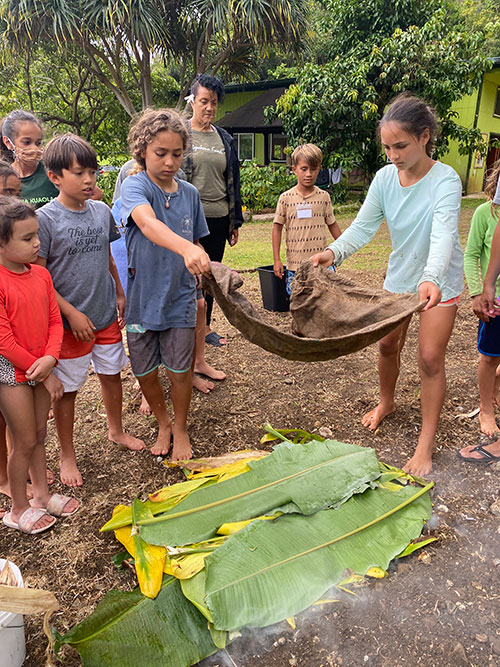News Releases | August 21, 2024
Share ThisInvestments Increase Literacy, Workforce Development, and Cultural/Language Preservation

Washington, DC— The Institute of Museum and Library Services (IMLS) today announced grants totaling $5,908,056, for 173 awards through programs designed to support and improve essential library services of Native American, Native Alaskan, and Native Hawaiian organizations.
Three of the programs that funded these awards were the Native American Library Services Basic Grants, Native American Library Enhancements Grants, and Native Hawaiian Library Services Grants. An additional project was funded through America250. America250 is the nationwide commemoration of America’s 250th anniversary in 2026 led by the U.S. Semiquincentennial Commission. IMLS is proud to support these institutions as they share America’s history, and where we stand today.
“Native American and Native Hawaiian libraries and cultural organizations are trusted, and vital centers of knowledge, deeply engaged with their communities on critical issues, such as literacy, health, workforce development, and the preservation and activation of culture and language,” said IMLS Acting Director Cyndee Landrum. “IMLS remains a committed and steadfast partner in supporting and enhancing the efforts of the libraries to support healthy, vibrant, and resilient Indigenous communities through Native American Library Services Enhancement and Basic Grants, as well as the Native Hawaiian Library Services Grant program.”
Native American Library Services Basic Grants are noncompetitive one-year grants of up to $10,000. The grants are available to federally recognized Native American Tribes and Alaska Native villages, corporations, and regional corporations and are designed to enable Native American Tribes to improve library services for their communities. 140 Grants totaling $1,528,960 were awarded to 156 federally recognized Tribes. Some examples of what grant funds may be used for include purchasing library materials and furnishings, renewing subscriptions, funding salaries and staff training/professional development, language and cultural activities, and providing internet connectivity and computers.
Native American Library Services Enhancement Grants advance the programs and services of eligible Native American Tribes, including Alaska Native villages, regional corporations, and village corporations. These competitive grants, awarded in amounts up to $150,000 for two years, are designed to improve core library services for their communities.
IMLS received nearly double the applications from the past several years, with a 14% increase in first time applicants. 54 eligible applications requesting $7,408,242 and was able to award $ 3,484,123 to 27 federally recognized Tribes in 11 states.
Native Hawaiian Library Services Grants are available to nonprofit organizations that primarily serve and represent Native Hawaiians. These competitive grants, awarded in amounts up to $150,000 for two years, are designed to improve core library services for their communities. IMLS received 7 applications, with an increase of 43% in new applicants, requesting $978,114 and awarded $747,407 to five organizations serving Native Hawaiians. Awardees come from different sectors aligned with developing and enhancing library services that are centered on Native Hawaiian core values.
Some examples of awarded projects include:
-
The Makah Cultural and Research Center’s Archives/Library Departments will collaborate with the Makah Language Program and Education Department, as well as the Makah Tribal Council’s Recovery Service and Senior Citizens Program to collectively work on the “Empowering Journey Project” to provide a path to wellness for Makah Tribal and community members in the Cape Flattery region of Washington. The program will support staff to increase access through the cataloging and transcription of newspaper collections, in addition to developing and implementing Makah language materials and workshops. Through the connection to their genealogy, ancestral history, and Makah place names, Makah community members will benefit by gaining a deeper understanding of their cultural roots and identity to achieve their goal of a vibrant, healthy community.
-
The Waagax Hakiruxara Hosto Library of the Ho-Chunk Nation of Wisconsin will build a body of materials that advance shared knowledge and learning opportunities for all. This project will support the acquisition of library-related materials, supplies, equipment, furnishings, and services. Ho-Chunk elders seek to ensure that all books, especially books with Native American cultural viewpoints, are available to readers of all ages. The library will protect Native voices and promote Native nation identity using several approaches such as book clubs, book events, artistic activities, and the restoration of community unification. This project also will feature the creation and maintenance of a website for the library.
-
The Kohe Mālamalama O Kanaloa – Protect Kahoʻolawe Fund will preserve and digitize the collection of documents and manuscripts of the late Noa Emmett Aluli, MD, a Moloka’i respected and beloved physician of the people, as well as one of the founders of the Protect Kahoʻolawe ʻOhana and the Aloha ʻĀina movement. Digitizing will provide a frontline view of the significant political, cultural, and spiritual movement. Partnering with the University of Hawaiʻi Mānoa and the Commission, project staff will upload the digital files to online platforms, making them accessible throughout Hawaiʻi and beyond to inspire Native Hawaiians of every generation to feel a sense of agency and to advocate for Native Hawaiian ways of being, doing, and connecting to one another.
About the Institute of Museum and Library Services
The Institute of Museum and Library Services is the primary source of federal support for the nation's libraries and museums. We advance, support, and empower America's museums, libraries, and related organizations through grantmaking, research, and policy development. IMLS envisions a nation where individuals and communities have access to museums and libraries to learn from and be inspired by the trusted information, ideas, and stories they contain about our diverse natural and cultural heritage. To learn more, visit www.imls.gov and follow us on Facebook and LinkedIn.
